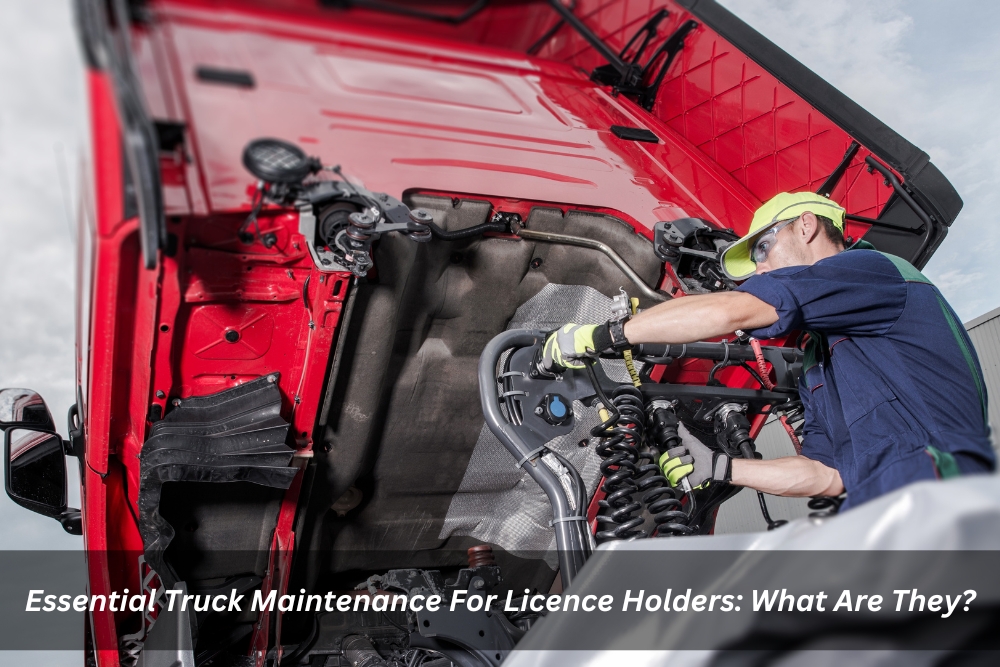If you’re a truck licence holder, you understand that operating a commercial vehicle comes with significant responsibilities. One of the most critical aspects of this responsibility is truck maintenance. Ensuring your truck is in top-notch condition is not just a legal obligation but also crucial for safety on the road and the longevity of your investment. In this comprehensive guide, we will explore essential truck maintenance practices, providing answers to questions that licence holders often have about keeping their vehicles in optimal shape.
What Does Truck Maintenance Entail?
Truck maintenance encompasses a wide range of tasks and checks to keep your vehicle operating safely and efficiently. It involves everything from routine inspections to addressing unexpected issues promptly. Here are the key elements of truck maintenance:
- Regular inspections
Regular inspections are the foundation of truck maintenance. These checks should occur daily before you hit the road and include examining crucial components like brakes, tyres, lights, and steering. Additionally, periodic inspections by a certified mechanic are essential.
- Fluid checks and changes
Truck engines rely on various fluids to operate smoothly. Regularly check and change engine oil, transmission fluid, coolant, and brake fluid according to the manufacturer’s recommendations.
- Tire maintenance
Proper tyre maintenance is vital for both safety and fuel efficiency. Ensure tyres are inflated to the correct pressure, rotated regularly, and replaced when they show signs of wear.
- Brake system maintenance
The brake system is arguably the most critical safety component of your truck. Regularly inspect brakes, replace worn brake pads, and have the brake system professionally checked to ensure it’s functioning correctly.
- Engine and transmission care
Regularly service the engine and transmission according to the manufacturer’s recommendations. This includes changing filters, inspecting belts and hoses, and addressing any abnormal engine noises.
- Electrical system checks
Faulty electrical systems can lead to various issues, from breakdowns to safety hazards. Regularly inspect and maintain all electrical components, including lights, batteries, and wiring.
- Suspension and steering
A well-maintained suspension and steering system are essential for a smooth and controlled ride. Ensure that all components are in good condition and lubricate them as needed.
- Emission control
Adhere to emission control requirements and have your truck tested regularly to meet environmental standards.
- Combating windscreen fogging
Maintaining clear visibility is crucial for safe truck driving. Fogging on the windshield can be a persistent issue, especially during specific weather conditions.
Why Is Truck Maintenance Crucial for Licence Holders?
Understanding the importance of truck maintenance is essential for all licence holders. Here are some key reasons why it should be a top priority:
- Safety first
Safety is paramount when you’re operating a large commercial vehicle. In addition to keeping key systems like brakes and lights in good working order, it’s also important to follow practical ways to maintain your car’s windscreen and avoid damage to reduce the risk of accidents.
- Cost savings
Regular maintenance can help prevent costly breakdowns and repairs. It’s more cost-effective to address small issues before they become major problems.
- Fuel efficiency
Well-maintained trucks operate more efficiently, which translates to better fuel economy. With rising fuel costs, this can significantly impact your bottom line.
- Vehicle longevity
Investing in truck maintenance can extend the lifespan of your vehicle. In addition, a well-cared-for truck is less likely to require premature replacement.
- Legal compliance
Truck maintenance isn’t just about safety; it’s also a legal requirement. Furthermore, failure to maintain your vehicle according to regulations can result in licence suspensions, fines, or even vehicle impoundment.
How Frequently Should Maintenance for Trucks Be Carried Out?
The frequency of truck maintenance depends on several factors, including the type of truck, its age, and the distance it travels. However, here’s a general guideline:
- Daily checks – Perform daily pre-trip inspections to ensure your truck is roadworthy. This includes checking brakes, lights, tyres, and essential fluids.
- Regular service – Follow the manufacturer’s recommended service schedule. Regular services include oil changes, filter replacements, and comprehensive inspections.
- Emergency repairs – In addition to routine maintenance, be prepared for emergency repairs. Carry essential tools and spare parts to address minor issues on the road.
Can You Conduct Maintenance for Trucks on Your Own?
While daily checks and minor tasks can be handled by drivers, it’s crucial to rely on certified mechanics for more complex maintenance and repairs. Professional mechanics have the expertise and equipment to diagnose and fix issues correctly. Attempting complex repairs without proper training can lead to further damage and safety risks.
Where Can You Get Truck Maintenance Services?
Finding a reliable truck maintenance service provider is essential. Here are some options:
- Dealerships – Truck dealerships often have certified mechanics who specialise in your truck’s make and model. They can provide comprehensive maintenance and warranty services.
- Independent Mechanics – Many independent mechanics specialise in commercial vehicles. So, look for reputable mechanics with experience in truck maintenance.
- Fleet Maintenance Companies – If you operate a fleet of trucks, consider partnering with a fleet maintenance company. They offer tailored maintenance programs to keep your entire fleet in top condition.
- In-House Maintenance – Some larger trucking companies have in-house maintenance facilities and mechanics to handle all their maintenance needs.
Conclusion
In summary, truck maintenance is an essential responsibility for licence holders. It ensures safety, legal compliance, cost savings, fuel efficiency, and the longevity of your vehicle. Regular inspections, fluid checks, tyre maintenance, brake system care, engine and transmission servicing, electrical system checks, suspension and steering maintenance, and emission control are all vital aspects of truck maintenance. By adhering to recommended maintenance schedules and seeking professional assistance when needed, you can keep your truck in optimal condition, ensuring a safer and more cost-effective operation on the road.
Are you a truck licence holder looking to enhance your skills and ensure top-notch truck maintenance practices? Look no further than Core Truck Driving School! Our expert instructors offer comprehensive training programs that not only sharpen your driving skills but also educate you on the crucial aspects of truck maintenance highlighted in the article above. Safety, compliance, and cost savings are at the heart of what we do. Join us today to become a responsible and skilled truck driver who understands the value of regular maintenance. Invest in your future with Core Truck Driving School and drive with confidence on the open road. Your journey to excellence begins here! Contact us today to get started.


